EAP 1 Portfolio: English for Academic Purposes at [University Name]
VerifiedAdded on 2021/04/17
|14
|4476
|15
Portfolio
AI Summary
This EAP 1 Portfolio assignment, designed for the English for Academic Purposes 1 course (EAPA3004), requires students to demonstrate and develop key academic writing skills. The portfolio includes a self-evaluation checklist to assess current abilities, a summarizing task comparing university fees in England and Nigeria, an essay outline, and a paragraph structure exercise. The core component is a 750-word compare and contrast essay relevant to higher education, developed throughout the semester. Students are expected to submit portfolio evidence (summarizing, outlining, and self-assessment) and the final written task by the deadline. The portfolio aims to improve students' abilities in producing cohesive and coherent academic writing and in reading, comparing, and summarizing academic texts. The total word count for the portfolio evidence and the written task is approximately 1650 words (+/- 10%).
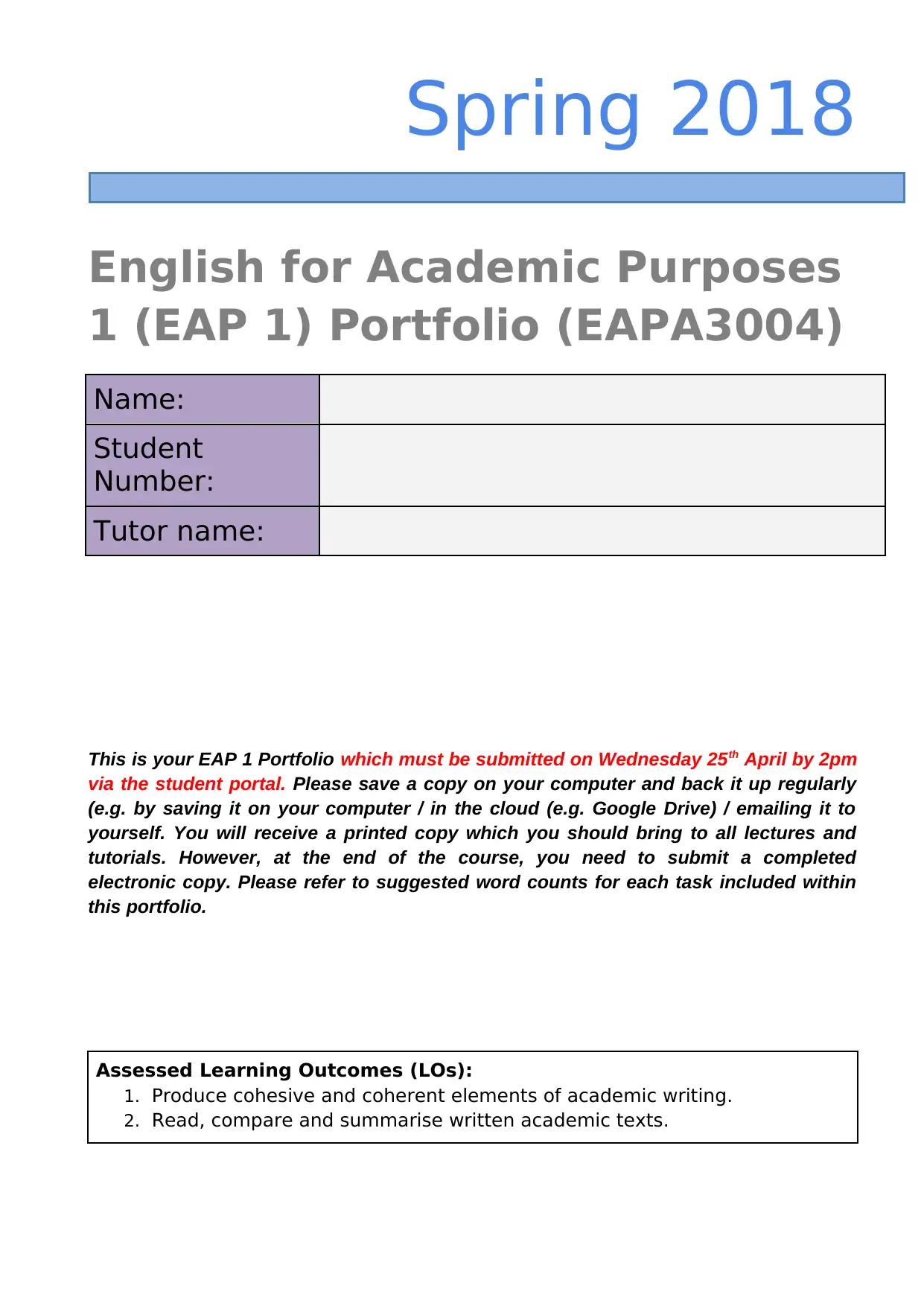
Spring 2018
English for Academic Purposes
1 (EAP 1) Portfolio (EAPA3004)
Name:
Student
Number:
Tutor name:
This is your EAP 1 Portfolio which must be submitted on Wednesday 25th April by 2pm
via the student portal. Please save a copy on your computer and back it up regularly
(e.g. by saving it on your computer / in the cloud (e.g. Google Drive) / emailing it to
yourself. You will receive a printed copy which you should bring to all lectures and
tutorials. However, at the end of the course, you need to submit a completed
electronic copy. Please refer to suggested word counts for each task included within
this portfolio.
Assessed Learning Outcomes (LOs):
1. Produce cohesive and coherent elements of academic writing.
2. Read, compare and summarise written academic texts.
English for Academic Purposes
1 (EAP 1) Portfolio (EAPA3004)
Name:
Student
Number:
Tutor name:
This is your EAP 1 Portfolio which must be submitted on Wednesday 25th April by 2pm
via the student portal. Please save a copy on your computer and back it up regularly
(e.g. by saving it on your computer / in the cloud (e.g. Google Drive) / emailing it to
yourself. You will receive a printed copy which you should bring to all lectures and
tutorials. However, at the end of the course, you need to submit a completed
electronic copy. Please refer to suggested word counts for each task included within
this portfolio.
Assessed Learning Outcomes (LOs):
1. Produce cohesive and coherent elements of academic writing.
2. Read, compare and summarise written academic texts.
Paraphrase This Document
Need a fresh take? Get an instant paraphrase of this document with our AI Paraphraser
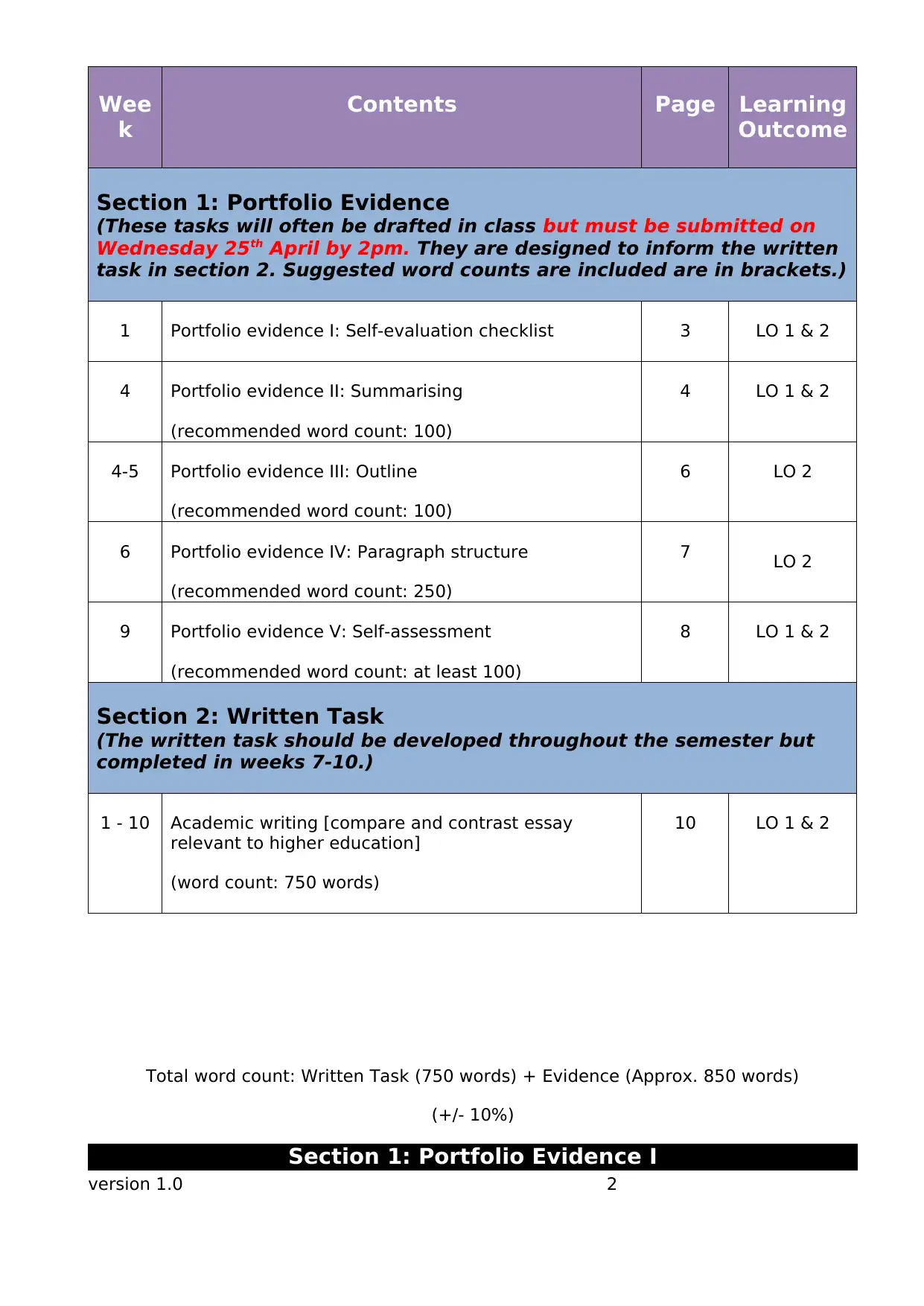
Wee
k
Contents Page Learning
Outcome
Section 1: Portfolio Evidence
(These tasks will often be drafted in class but must be submitted on
Wednesday 25th April by 2pm. They are designed to inform the written
task in section 2. Suggested word counts are included are in brackets.)
1 Portfolio evidence I: Self-evaluation checklist 3 LO 1 & 2
4 Portfolio evidence II: Summarising
(recommended word count: 100)
4 LO 1 & 2
4-5 Portfolio evidence III: Outline
(recommended word count: 100)
6 LO 2
6 Portfolio evidence IV: Paragraph structure
(recommended word count: 250)
7 LO 2
9 Portfolio evidence V: Self-assessment
(recommended word count: at least 100)
8 LO 1 & 2
Section 2: Written Task
(The written task should be developed throughout the semester but
completed in weeks 7-10.)
1 - 10 Academic writing [compare and contrast essay
relevant to higher education]
(word count: 750 words)
10 LO 1 & 2
Total word count: Written Task (750 words) + Evidence (Approx. 850 words)
(+/- 10%)
Section 1: Portfolio Evidence I
version 1.0 2
k
Contents Page Learning
Outcome
Section 1: Portfolio Evidence
(These tasks will often be drafted in class but must be submitted on
Wednesday 25th April by 2pm. They are designed to inform the written
task in section 2. Suggested word counts are included are in brackets.)
1 Portfolio evidence I: Self-evaluation checklist 3 LO 1 & 2
4 Portfolio evidence II: Summarising
(recommended word count: 100)
4 LO 1 & 2
4-5 Portfolio evidence III: Outline
(recommended word count: 100)
6 LO 2
6 Portfolio evidence IV: Paragraph structure
(recommended word count: 250)
7 LO 2
9 Portfolio evidence V: Self-assessment
(recommended word count: at least 100)
8 LO 1 & 2
Section 2: Written Task
(The written task should be developed throughout the semester but
completed in weeks 7-10.)
1 - 10 Academic writing [compare and contrast essay
relevant to higher education]
(word count: 750 words)
10 LO 1 & 2
Total word count: Written Task (750 words) + Evidence (Approx. 850 words)
(+/- 10%)
Section 1: Portfolio Evidence I
version 1.0 2
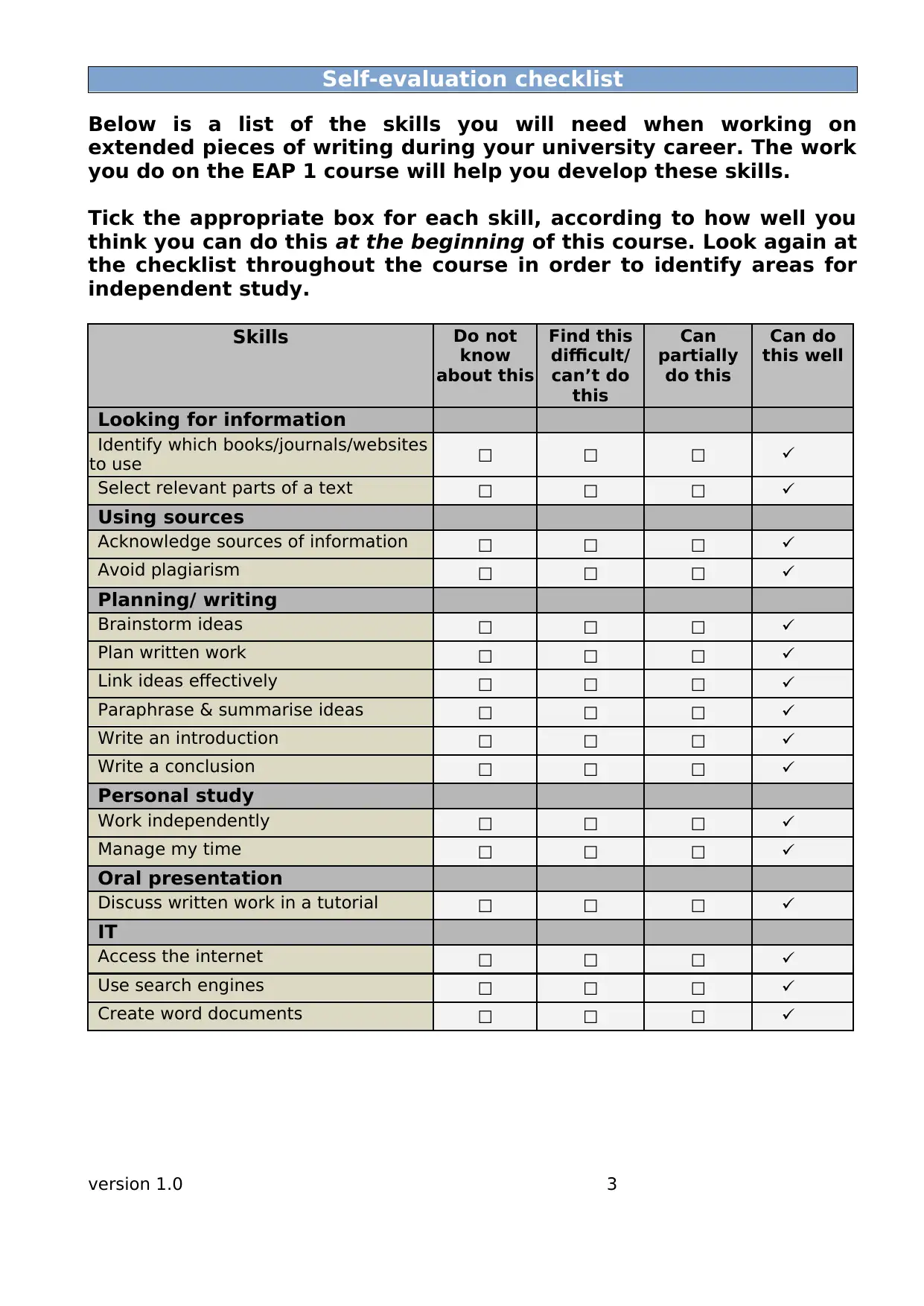
Self-evaluation checklist
Below is a list of the skills you will need when working on
extended pieces of writing during your university career. The work
you do on the EAP 1 course will help you develop these skills.
Tick the appropriate box for each skill, according to how well you
think you can do this at the beginning of this course. Look again at
the checklist throughout the course in order to identify areas for
independent study.
Skills Do not
know
about this
Find this
difficult/
can’t do
this
Can
partially
do this
Can do
this well
Looking for information
Identify which books/journals/websites
to use ☐ ☐ ☐
Select relevant parts of a text ☐ ☐ ☐
Using sources
Acknowledge sources of information ☐ ☐ ☐
Avoid plagiarism ☐ ☐ ☐
Planning/ writing
Brainstorm ideas ☐ ☐ ☐
Plan written work ☐ ☐ ☐
Link ideas effectively ☐ ☐ ☐
Paraphrase & summarise ideas ☐ ☐ ☐
Write an introduction ☐ ☐ ☐
Write a conclusion ☐ ☐ ☐
Personal study
Work independently ☐ ☐ ☐
Manage my time ☐ ☐ ☐
Oral presentation
Discuss written work in a tutorial ☐ ☐ ☐
IT
Access the internet ☐ ☐ ☐
Use search engines ☐ ☐ ☐
Create word documents ☐ ☐ ☐
version 1.0 3
Below is a list of the skills you will need when working on
extended pieces of writing during your university career. The work
you do on the EAP 1 course will help you develop these skills.
Tick the appropriate box for each skill, according to how well you
think you can do this at the beginning of this course. Look again at
the checklist throughout the course in order to identify areas for
independent study.
Skills Do not
know
about this
Find this
difficult/
can’t do
this
Can
partially
do this
Can do
this well
Looking for information
Identify which books/journals/websites
to use ☐ ☐ ☐
Select relevant parts of a text ☐ ☐ ☐
Using sources
Acknowledge sources of information ☐ ☐ ☐
Avoid plagiarism ☐ ☐ ☐
Planning/ writing
Brainstorm ideas ☐ ☐ ☐
Plan written work ☐ ☐ ☐
Link ideas effectively ☐ ☐ ☐
Paraphrase & summarise ideas ☐ ☐ ☐
Write an introduction ☐ ☐ ☐
Write a conclusion ☐ ☐ ☐
Personal study
Work independently ☐ ☐ ☐
Manage my time ☐ ☐ ☐
Oral presentation
Discuss written work in a tutorial ☐ ☐ ☐
IT
Access the internet ☐ ☐ ☐
Use search engines ☐ ☐ ☐
Create word documents ☐ ☐ ☐
version 1.0 3
⊘ This is a preview!⊘
Do you want full access?
Subscribe today to unlock all pages.

Trusted by 1+ million students worldwide
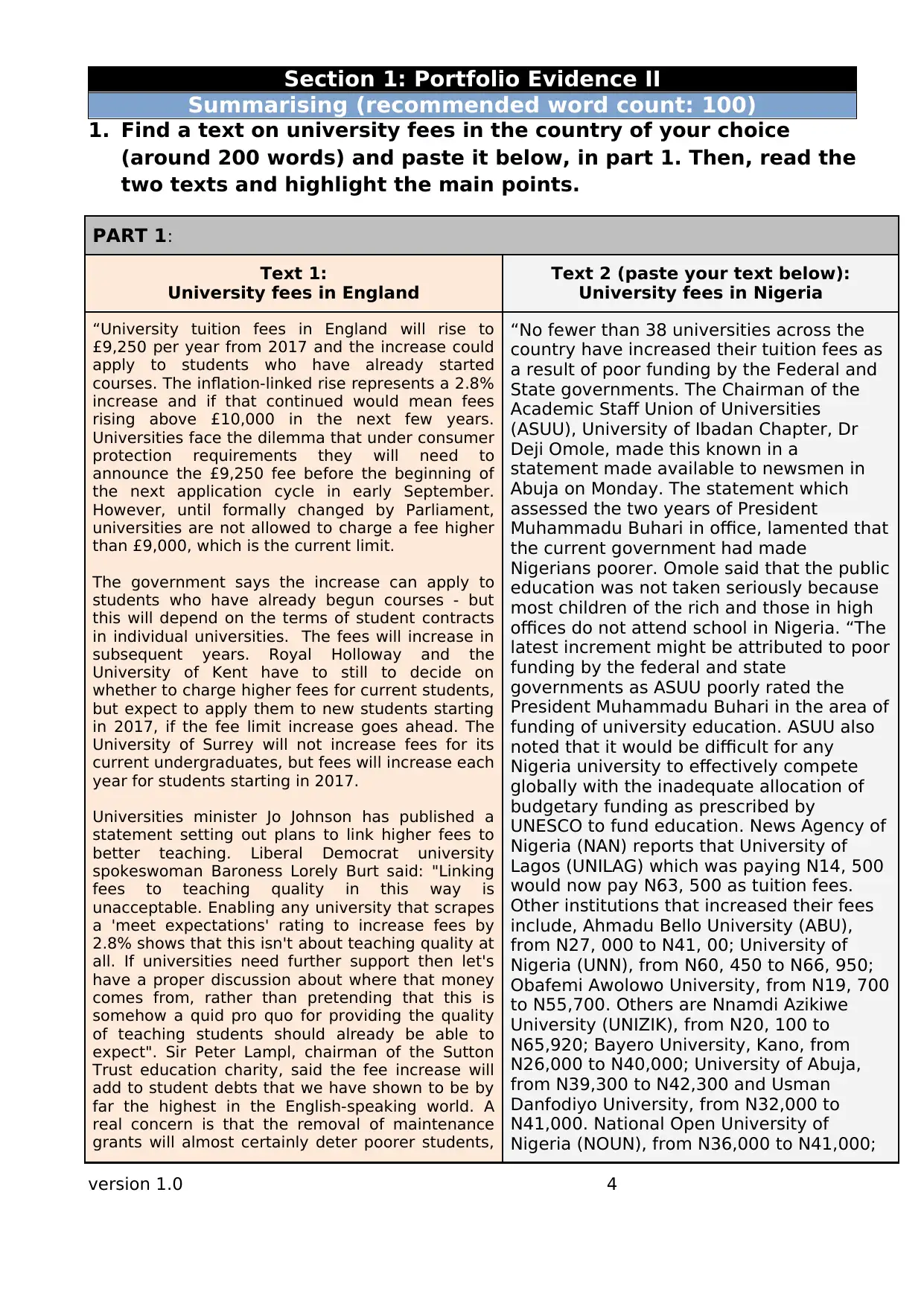
Section 1: Portfolio Evidence II
Summarising (recommended word count: 100)
1. Find a text on university fees in the country of your choice
(around 200 words) and paste it below, in part 1. Then, read the
two texts and highlight the main points.
PART 1:
Text 1:
University fees in England
Text 2 (paste your text below):
University fees in Nigeria
“University tuition fees in England will rise to
£9,250 per year from 2017 and the increase could
apply to students who have already started
courses. The inflation-linked rise represents a 2.8%
increase and if that continued would mean fees
rising above £10,000 in the next few years.
Universities face the dilemma that under consumer
protection requirements they will need to
announce the £9,250 fee before the beginning of
the next application cycle in early September.
However, until formally changed by Parliament,
universities are not allowed to charge a fee higher
than £9,000, which is the current limit.
The government says the increase can apply to
students who have already begun courses - but
this will depend on the terms of student contracts
in individual universities. The fees will increase in
subsequent years. Royal Holloway and the
University of Kent have to still to decide on
whether to charge higher fees for current students,
but expect to apply them to new students starting
in 2017, if the fee limit increase goes ahead. The
University of Surrey will not increase fees for its
current undergraduates, but fees will increase each
year for students starting in 2017.
Universities minister Jo Johnson has published a
statement setting out plans to link higher fees to
better teaching. Liberal Democrat university
spokeswoman Baroness Lorely Burt said: "Linking
fees to teaching quality in this way is
unacceptable. Enabling any university that scrapes
a 'meet expectations' rating to increase fees by
2.8% shows that this isn't about teaching quality at
all. If universities need further support then let's
have a proper discussion about where that money
comes from, rather than pretending that this is
somehow a quid pro quo for providing the quality
of teaching students should already be able to
expect". Sir Peter Lampl, chairman of the Sutton
Trust education charity, said the fee increase will
add to student debts that we have shown to be by
far the highest in the English-speaking world. A
real concern is that the removal of maintenance
grants will almost certainly deter poorer students,
“No fewer than 38 universities across the
country have increased their tuition fees as
a result of poor funding by the Federal and
State governments. The Chairman of the
Academic Staff Union of Universities
(ASUU), University of Ibadan Chapter, Dr
Deji Omole, made this known in a
statement made available to newsmen in
Abuja on Monday. The statement which
assessed the two years of President
Muhammadu Buhari in office, lamented that
the current government had made
Nigerians poorer. Omole said that the public
education was not taken seriously because
most children of the rich and those in high
offices do not attend school in Nigeria. “The
latest increment might be attributed to poor
funding by the federal and state
governments as ASUU poorly rated the
President Muhammadu Buhari in the area of
funding of university education. ASUU also
noted that it would be difficult for any
Nigeria university to effectively compete
globally with the inadequate allocation of
budgetary funding as prescribed by
UNESCO to fund education. News Agency of
Nigeria (NAN) reports that University of
Lagos (UNILAG) which was paying N14, 500
would now pay N63, 500 as tuition fees.
Other institutions that increased their fees
include, Ahmadu Bello University (ABU),
from N27, 000 to N41, 00; University of
Nigeria (UNN), from N60, 450 to N66, 950;
Obafemi Awolowo University, from N19, 700
to N55,700. Others are Nnamdi Azikiwe
University (UNIZIK), from N20, 100 to
N65,920; Bayero University, Kano, from
N26,000 to N40,000; University of Abuja,
from N39,300 to N42,300 and Usman
Danfodiyo University, from N32,000 to
N41,000. National Open University of
Nigeria (NOUN), from N36,000 to N41,000;
version 1.0 4
Summarising (recommended word count: 100)
1. Find a text on university fees in the country of your choice
(around 200 words) and paste it below, in part 1. Then, read the
two texts and highlight the main points.
PART 1:
Text 1:
University fees in England
Text 2 (paste your text below):
University fees in Nigeria
“University tuition fees in England will rise to
£9,250 per year from 2017 and the increase could
apply to students who have already started
courses. The inflation-linked rise represents a 2.8%
increase and if that continued would mean fees
rising above £10,000 in the next few years.
Universities face the dilemma that under consumer
protection requirements they will need to
announce the £9,250 fee before the beginning of
the next application cycle in early September.
However, until formally changed by Parliament,
universities are not allowed to charge a fee higher
than £9,000, which is the current limit.
The government says the increase can apply to
students who have already begun courses - but
this will depend on the terms of student contracts
in individual universities. The fees will increase in
subsequent years. Royal Holloway and the
University of Kent have to still to decide on
whether to charge higher fees for current students,
but expect to apply them to new students starting
in 2017, if the fee limit increase goes ahead. The
University of Surrey will not increase fees for its
current undergraduates, but fees will increase each
year for students starting in 2017.
Universities minister Jo Johnson has published a
statement setting out plans to link higher fees to
better teaching. Liberal Democrat university
spokeswoman Baroness Lorely Burt said: "Linking
fees to teaching quality in this way is
unacceptable. Enabling any university that scrapes
a 'meet expectations' rating to increase fees by
2.8% shows that this isn't about teaching quality at
all. If universities need further support then let's
have a proper discussion about where that money
comes from, rather than pretending that this is
somehow a quid pro quo for providing the quality
of teaching students should already be able to
expect". Sir Peter Lampl, chairman of the Sutton
Trust education charity, said the fee increase will
add to student debts that we have shown to be by
far the highest in the English-speaking world. A
real concern is that the removal of maintenance
grants will almost certainly deter poorer students,
“No fewer than 38 universities across the
country have increased their tuition fees as
a result of poor funding by the Federal and
State governments. The Chairman of the
Academic Staff Union of Universities
(ASUU), University of Ibadan Chapter, Dr
Deji Omole, made this known in a
statement made available to newsmen in
Abuja on Monday. The statement which
assessed the two years of President
Muhammadu Buhari in office, lamented that
the current government had made
Nigerians poorer. Omole said that the public
education was not taken seriously because
most children of the rich and those in high
offices do not attend school in Nigeria. “The
latest increment might be attributed to poor
funding by the federal and state
governments as ASUU poorly rated the
President Muhammadu Buhari in the area of
funding of university education. ASUU also
noted that it would be difficult for any
Nigeria university to effectively compete
globally with the inadequate allocation of
budgetary funding as prescribed by
UNESCO to fund education. News Agency of
Nigeria (NAN) reports that University of
Lagos (UNILAG) which was paying N14, 500
would now pay N63, 500 as tuition fees.
Other institutions that increased their fees
include, Ahmadu Bello University (ABU),
from N27, 000 to N41, 00; University of
Nigeria (UNN), from N60, 450 to N66, 950;
Obafemi Awolowo University, from N19, 700
to N55,700. Others are Nnamdi Azikiwe
University (UNIZIK), from N20, 100 to
N65,920; Bayero University, Kano, from
N26,000 to N40,000; University of Abuja,
from N39,300 to N42,300 and Usman
Danfodiyo University, from N32,000 to
N41,000. National Open University of
Nigeria (NOUN), from N36,000 to N41,000;
version 1.0 4
Paraphrase This Document
Need a fresh take? Get an instant paraphrase of this document with our AI Paraphraser
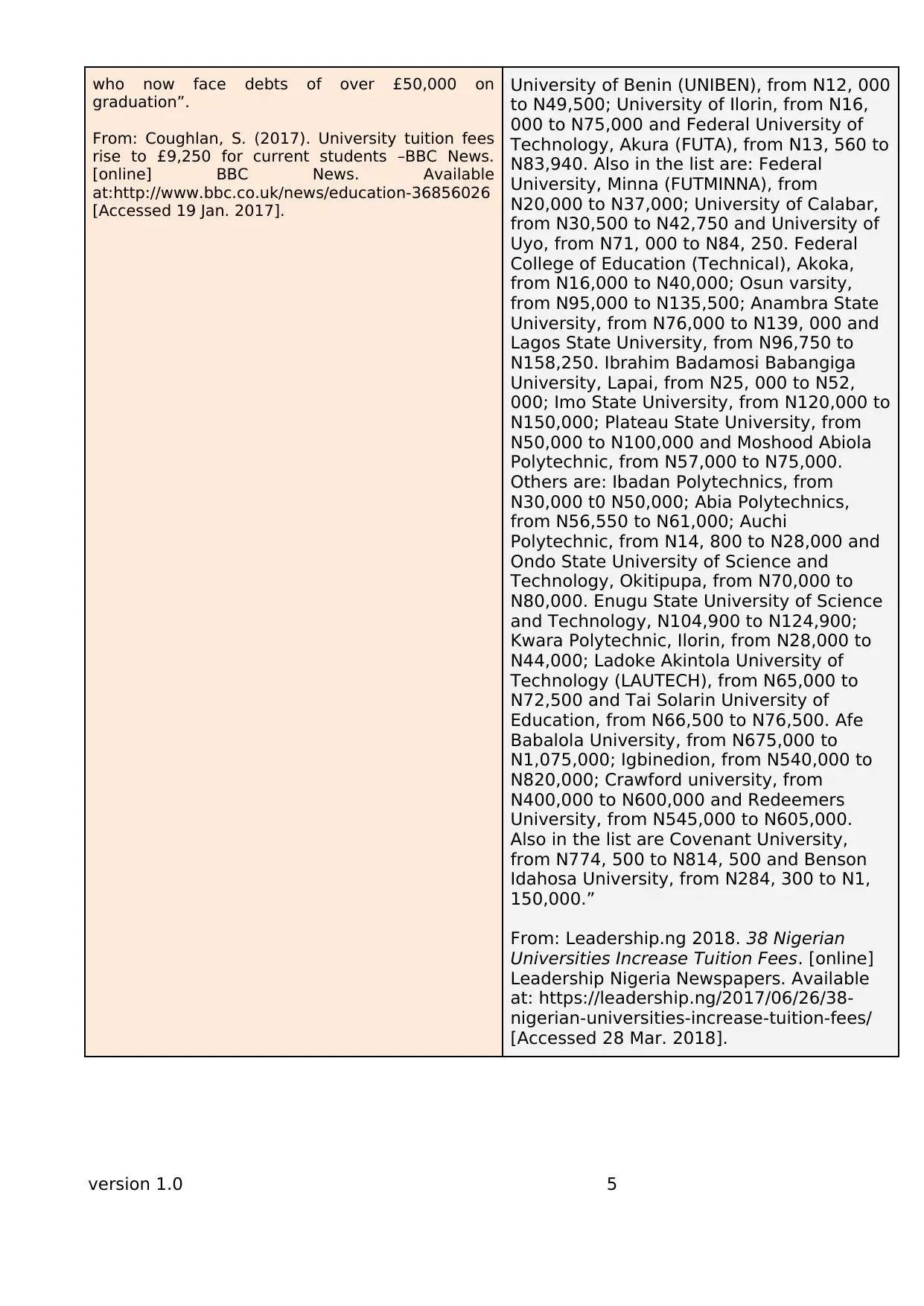
who now face debts of over £50,000 on
graduation”.
From: Coughlan, S. (2017). University tuition fees
rise to £9,250 for current students –BBC News.
[online] BBC News. Available
at:http://www.bbc.co.uk/news/education-36856026
[Accessed 19 Jan. 2017].
University of Benin (UNIBEN), from N12, 000
to N49,500; University of Ilorin, from N16,
000 to N75,000 and Federal University of
Technology, Akura (FUTA), from N13, 560 to
N83,940. Also in the list are: Federal
University, Minna (FUTMINNA), from
N20,000 to N37,000; University of Calabar,
from N30,500 to N42,750 and University of
Uyo, from N71, 000 to N84, 250. Federal
College of Education (Technical), Akoka,
from N16,000 to N40,000; Osun varsity,
from N95,000 to N135,500; Anambra State
University, from N76,000 to N139, 000 and
Lagos State University, from N96,750 to
N158,250. Ibrahim Badamosi Babangiga
University, Lapai, from N25, 000 to N52,
000; Imo State University, from N120,000 to
N150,000; Plateau State University, from
N50,000 to N100,000 and Moshood Abiola
Polytechnic, from N57,000 to N75,000.
Others are: Ibadan Polytechnics, from
N30,000 t0 N50,000; Abia Polytechnics,
from N56,550 to N61,000; Auchi
Polytechnic, from N14, 800 to N28,000 and
Ondo State University of Science and
Technology, Okitipupa, from N70,000 to
N80,000. Enugu State University of Science
and Technology, N104,900 to N124,900;
Kwara Polytechnic, Ilorin, from N28,000 to
N44,000; Ladoke Akintola University of
Technology (LAUTECH), from N65,000 to
N72,500 and Tai Solarin University of
Education, from N66,500 to N76,500. Afe
Babalola University, from N675,000 to
N1,075,000; Igbinedion, from N540,000 to
N820,000; Crawford university, from
N400,000 to N600,000 and Redeemers
University, from N545,000 to N605,000.
Also in the list are Covenant University,
from N774, 500 to N814, 500 and Benson
Idahosa University, from N284, 300 to N1,
150,000.”
From: Leadership.ng 2018. 38 Nigerian
Universities Increase Tuition Fees. [online]
Leadership Nigeria Newspapers. Available
at: https://leadership.ng/2017/06/26/38-
nigerian-universities-increase-tuition-fees/
[Accessed 28 Mar. 2018].
version 1.0 5
graduation”.
From: Coughlan, S. (2017). University tuition fees
rise to £9,250 for current students –BBC News.
[online] BBC News. Available
at:http://www.bbc.co.uk/news/education-36856026
[Accessed 19 Jan. 2017].
University of Benin (UNIBEN), from N12, 000
to N49,500; University of Ilorin, from N16,
000 to N75,000 and Federal University of
Technology, Akura (FUTA), from N13, 560 to
N83,940. Also in the list are: Federal
University, Minna (FUTMINNA), from
N20,000 to N37,000; University of Calabar,
from N30,500 to N42,750 and University of
Uyo, from N71, 000 to N84, 250. Federal
College of Education (Technical), Akoka,
from N16,000 to N40,000; Osun varsity,
from N95,000 to N135,500; Anambra State
University, from N76,000 to N139, 000 and
Lagos State University, from N96,750 to
N158,250. Ibrahim Badamosi Babangiga
University, Lapai, from N25, 000 to N52,
000; Imo State University, from N120,000 to
N150,000; Plateau State University, from
N50,000 to N100,000 and Moshood Abiola
Polytechnic, from N57,000 to N75,000.
Others are: Ibadan Polytechnics, from
N30,000 t0 N50,000; Abia Polytechnics,
from N56,550 to N61,000; Auchi
Polytechnic, from N14, 800 to N28,000 and
Ondo State University of Science and
Technology, Okitipupa, from N70,000 to
N80,000. Enugu State University of Science
and Technology, N104,900 to N124,900;
Kwara Polytechnic, Ilorin, from N28,000 to
N44,000; Ladoke Akintola University of
Technology (LAUTECH), from N65,000 to
N72,500 and Tai Solarin University of
Education, from N66,500 to N76,500. Afe
Babalola University, from N675,000 to
N1,075,000; Igbinedion, from N540,000 to
N820,000; Crawford university, from
N400,000 to N600,000 and Redeemers
University, from N545,000 to N605,000.
Also in the list are Covenant University,
from N774, 500 to N814, 500 and Benson
Idahosa University, from N284, 300 to N1,
150,000.”
From: Leadership.ng 2018. 38 Nigerian
Universities Increase Tuition Fees. [online]
Leadership Nigeria Newspapers. Available
at: https://leadership.ng/2017/06/26/38-
nigerian-universities-increase-tuition-fees/
[Accessed 28 Mar. 2018].
version 1.0 5
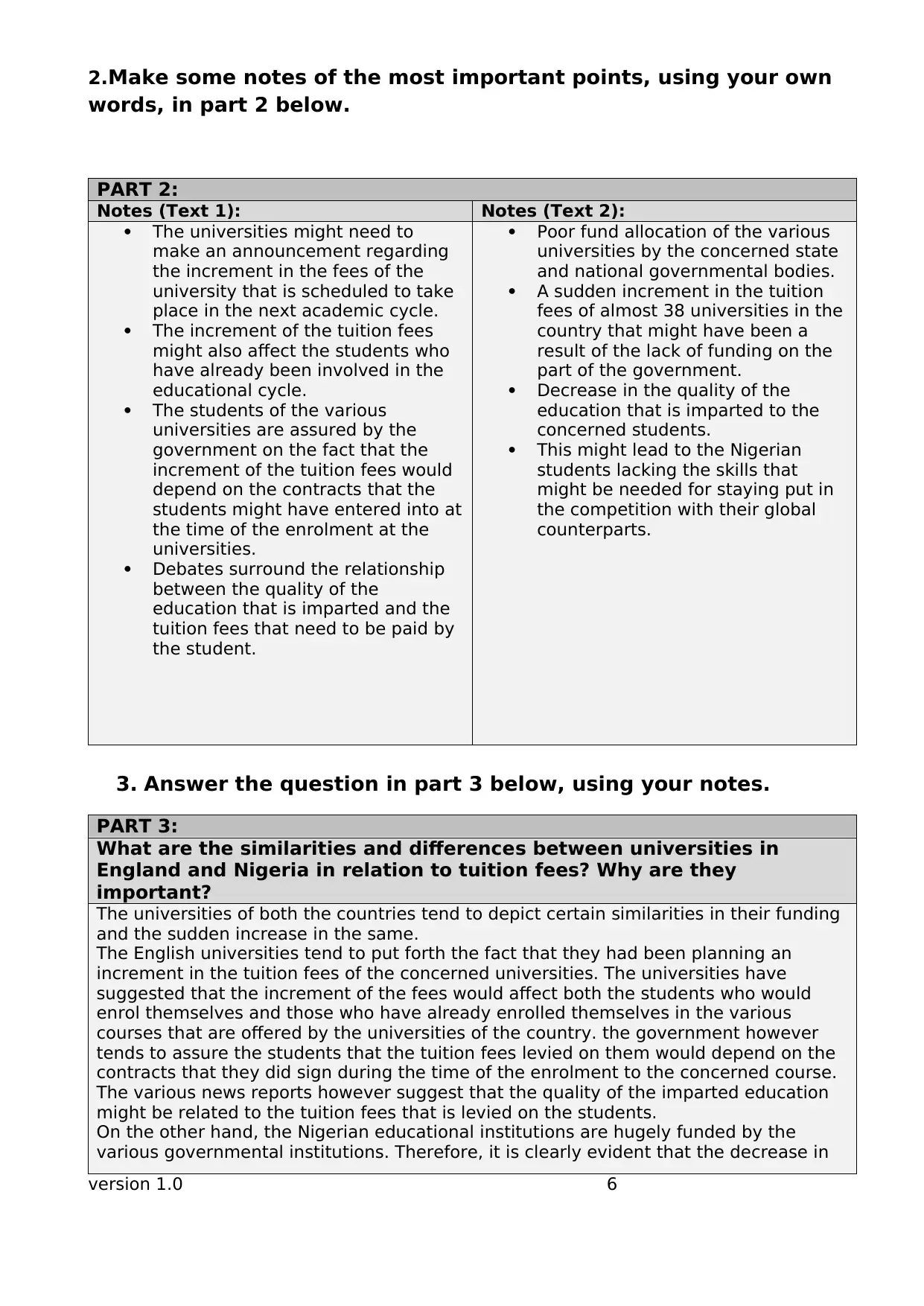
2.Make some notes of the most important points, using your own
words, in part 2 below.
PART 2:
Notes (Text 1): Notes (Text 2):
The universities might need to
make an announcement regarding
the increment in the fees of the
university that is scheduled to take
place in the next academic cycle.
The increment of the tuition fees
might also affect the students who
have already been involved in the
educational cycle.
The students of the various
universities are assured by the
government on the fact that the
increment of the tuition fees would
depend on the contracts that the
students might have entered into at
the time of the enrolment at the
universities.
Debates surround the relationship
between the quality of the
education that is imparted and the
tuition fees that need to be paid by
the student.
Poor fund allocation of the various
universities by the concerned state
and national governmental bodies.
A sudden increment in the tuition
fees of almost 38 universities in the
country that might have been a
result of the lack of funding on the
part of the government.
Decrease in the quality of the
education that is imparted to the
concerned students.
This might lead to the Nigerian
students lacking the skills that
might be needed for staying put in
the competition with their global
counterparts.
3. Answer the question in part 3 below, using your notes.
PART 3:
What are the similarities and differences between universities in
England and Nigeria in relation to tuition fees? Why are they
important?
The universities of both the countries tend to depict certain similarities in their funding
and the sudden increase in the same.
The English universities tend to put forth the fact that they had been planning an
increment in the tuition fees of the concerned universities. The universities have
suggested that the increment of the fees would affect both the students who would
enrol themselves and those who have already enrolled themselves in the various
courses that are offered by the universities of the country. the government however
tends to assure the students that the tuition fees levied on them would depend on the
contracts that they did sign during the time of the enrolment to the concerned course.
The various news reports however suggest that the quality of the imparted education
might be related to the tuition fees that is levied on the students.
On the other hand, the Nigerian educational institutions are hugely funded by the
various governmental institutions. Therefore, it is clearly evident that the decrease in
version 1.0 6
words, in part 2 below.
PART 2:
Notes (Text 1): Notes (Text 2):
The universities might need to
make an announcement regarding
the increment in the fees of the
university that is scheduled to take
place in the next academic cycle.
The increment of the tuition fees
might also affect the students who
have already been involved in the
educational cycle.
The students of the various
universities are assured by the
government on the fact that the
increment of the tuition fees would
depend on the contracts that the
students might have entered into at
the time of the enrolment at the
universities.
Debates surround the relationship
between the quality of the
education that is imparted and the
tuition fees that need to be paid by
the student.
Poor fund allocation of the various
universities by the concerned state
and national governmental bodies.
A sudden increment in the tuition
fees of almost 38 universities in the
country that might have been a
result of the lack of funding on the
part of the government.
Decrease in the quality of the
education that is imparted to the
concerned students.
This might lead to the Nigerian
students lacking the skills that
might be needed for staying put in
the competition with their global
counterparts.
3. Answer the question in part 3 below, using your notes.
PART 3:
What are the similarities and differences between universities in
England and Nigeria in relation to tuition fees? Why are they
important?
The universities of both the countries tend to depict certain similarities in their funding
and the sudden increase in the same.
The English universities tend to put forth the fact that they had been planning an
increment in the tuition fees of the concerned universities. The universities have
suggested that the increment of the fees would affect both the students who would
enrol themselves and those who have already enrolled themselves in the various
courses that are offered by the universities of the country. the government however
tends to assure the students that the tuition fees levied on them would depend on the
contracts that they did sign during the time of the enrolment to the concerned course.
The various news reports however suggest that the quality of the imparted education
might be related to the tuition fees that is levied on the students.
On the other hand, the Nigerian educational institutions are hugely funded by the
various governmental institutions. Therefore, it is clearly evident that the decrease in
version 1.0 6
⊘ This is a preview!⊘
Do you want full access?
Subscribe today to unlock all pages.

Trusted by 1+ million students worldwide
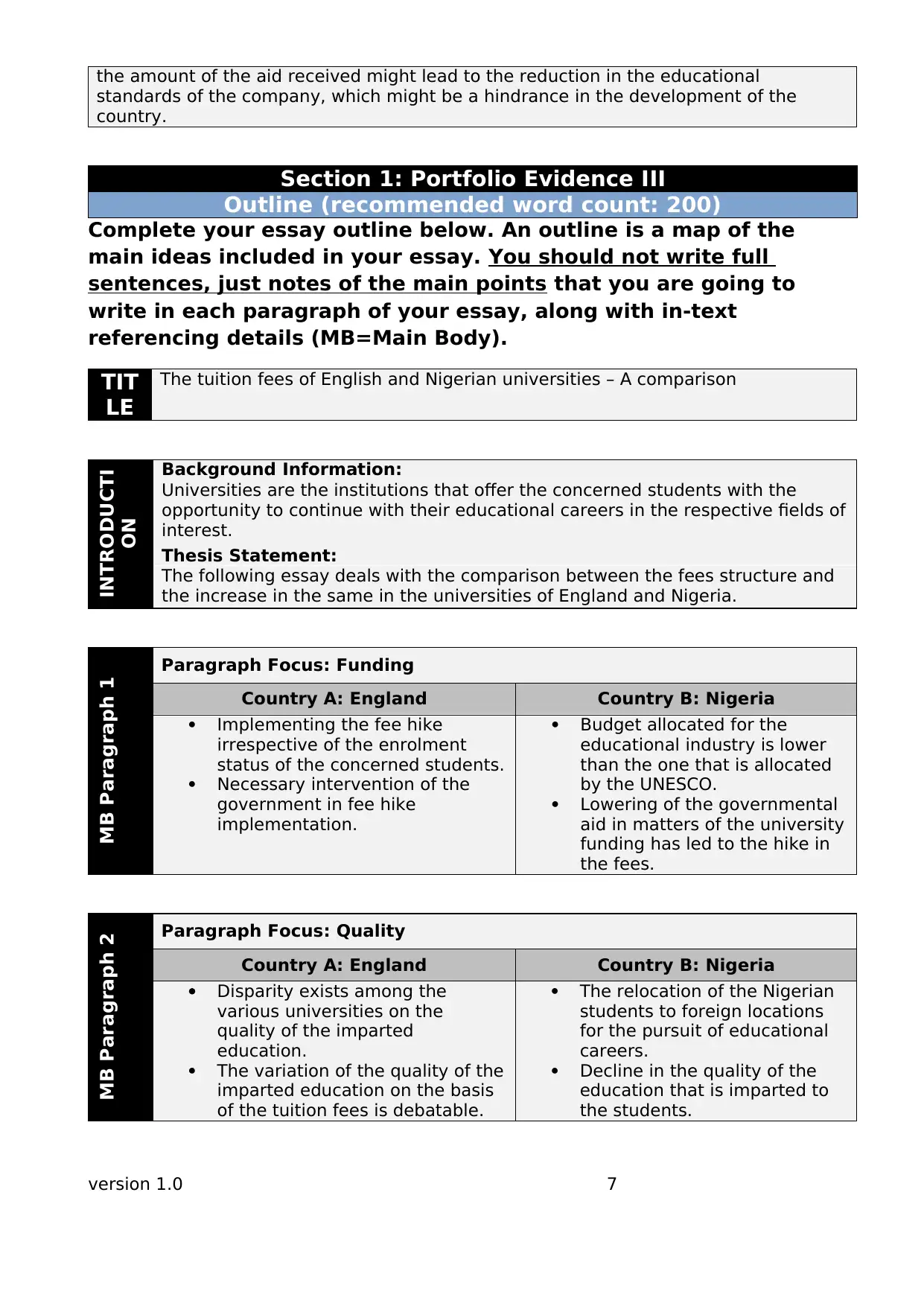
the amount of the aid received might lead to the reduction in the educational
standards of the company, which might be a hindrance in the development of the
country.
Section 1: Portfolio Evidence III
Outline (recommended word count: 200)
Complete your essay outline below. An outline is a map of the
main ideas included in your essay. You should not write full
sentences, just notes of the main points that you are going to
write in each paragraph of your essay, along with in-text
referencing details (MB=Main Body).
TIT
LE
The tuition fees of English and Nigerian universities – A comparison
INTRODUCTI
ON
Background Information:
Universities are the institutions that offer the concerned students with the
opportunity to continue with their educational careers in the respective fields of
interest.
Thesis Statement:
The following essay deals with the comparison between the fees structure and
the increase in the same in the universities of England and Nigeria.
MB Paragraph 1 Paragraph Focus: Funding
Country A: England Country B: Nigeria
Implementing the fee hike
irrespective of the enrolment
status of the concerned students.
Necessary intervention of the
government in fee hike
implementation.
Budget allocated for the
educational industry is lower
than the one that is allocated
by the UNESCO.
Lowering of the governmental
aid in matters of the university
funding has led to the hike in
the fees.
MB Paragraph 2 Paragraph Focus: Quality
Country A: England Country B: Nigeria
Disparity exists among the
various universities on the
quality of the imparted
education.
The variation of the quality of the
imparted education on the basis
of the tuition fees is debatable.
The relocation of the Nigerian
students to foreign locations
for the pursuit of educational
careers.
Decline in the quality of the
education that is imparted to
the students.
version 1.0 7
standards of the company, which might be a hindrance in the development of the
country.
Section 1: Portfolio Evidence III
Outline (recommended word count: 200)
Complete your essay outline below. An outline is a map of the
main ideas included in your essay. You should not write full
sentences, just notes of the main points that you are going to
write in each paragraph of your essay, along with in-text
referencing details (MB=Main Body).
TIT
LE
The tuition fees of English and Nigerian universities – A comparison
INTRODUCTI
ON
Background Information:
Universities are the institutions that offer the concerned students with the
opportunity to continue with their educational careers in the respective fields of
interest.
Thesis Statement:
The following essay deals with the comparison between the fees structure and
the increase in the same in the universities of England and Nigeria.
MB Paragraph 1 Paragraph Focus: Funding
Country A: England Country B: Nigeria
Implementing the fee hike
irrespective of the enrolment
status of the concerned students.
Necessary intervention of the
government in fee hike
implementation.
Budget allocated for the
educational industry is lower
than the one that is allocated
by the UNESCO.
Lowering of the governmental
aid in matters of the university
funding has led to the hike in
the fees.
MB Paragraph 2 Paragraph Focus: Quality
Country A: England Country B: Nigeria
Disparity exists among the
various universities on the
quality of the imparted
education.
The variation of the quality of the
imparted education on the basis
of the tuition fees is debatable.
The relocation of the Nigerian
students to foreign locations
for the pursuit of educational
careers.
Decline in the quality of the
education that is imparted to
the students.
version 1.0 7
Paraphrase This Document
Need a fresh take? Get an instant paraphrase of this document with our AI Paraphraser
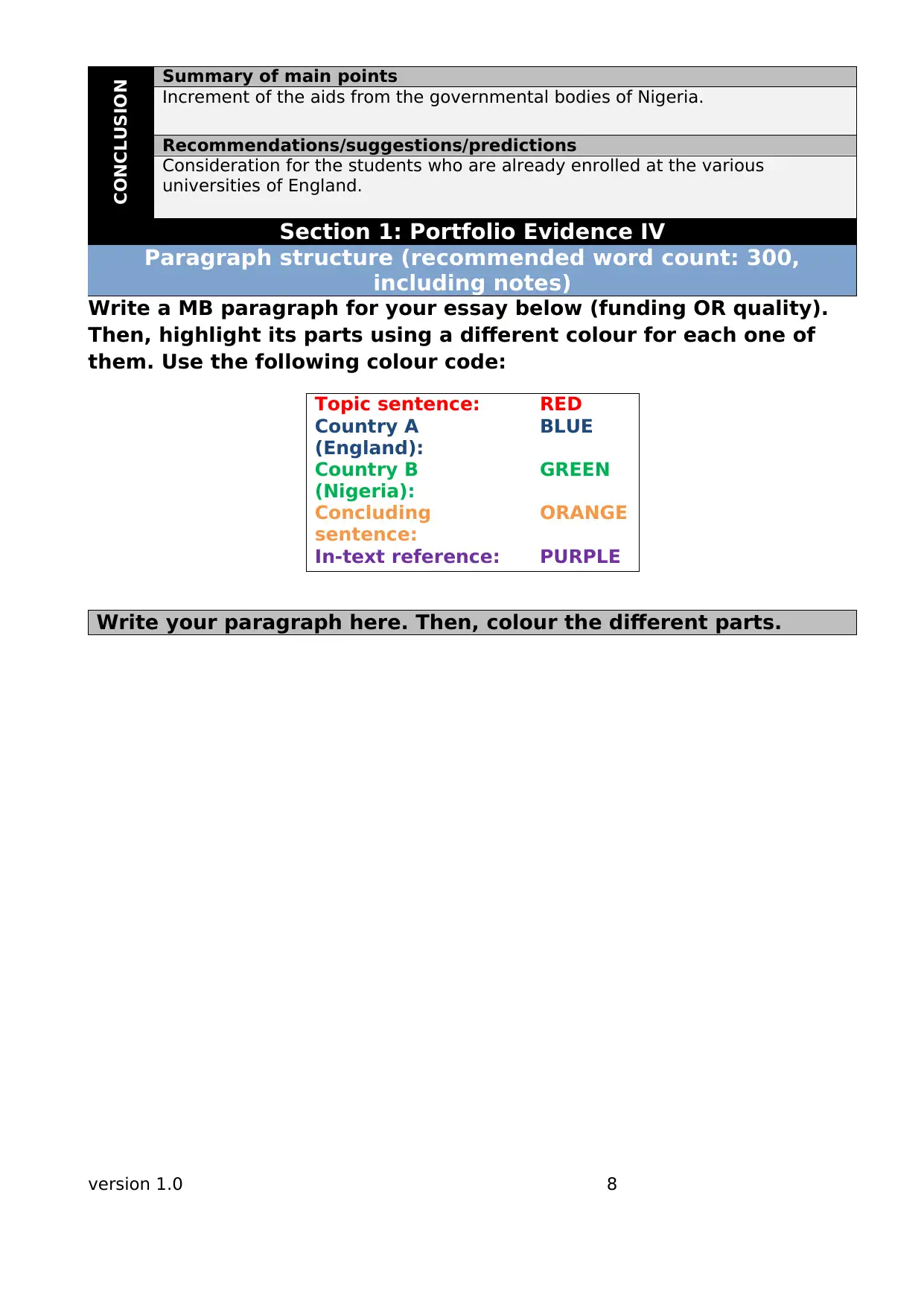
CONCLUSION Summary of main points
Increment of the aids from the governmental bodies of Nigeria.
Recommendations/suggestions/predictions
Consideration for the students who are already enrolled at the various
universities of England.
Section 1: Portfolio Evidence IV
Paragraph structure (recommended word count: 300,
including notes)
Write a MB paragraph for your essay below (funding OR quality).
Then, highlight its parts using a different colour for each one of
them. Use the following colour code:
Topic sentence: RED
Country A
(England):
BLUE
Country B
(Nigeria):
GREEN
Concluding
sentence:
ORANGE
In-text reference: PURPLE
Write your paragraph here. Then, colour the different parts.
version 1.0 8
Increment of the aids from the governmental bodies of Nigeria.
Recommendations/suggestions/predictions
Consideration for the students who are already enrolled at the various
universities of England.
Section 1: Portfolio Evidence IV
Paragraph structure (recommended word count: 300,
including notes)
Write a MB paragraph for your essay below (funding OR quality).
Then, highlight its parts using a different colour for each one of
them. Use the following colour code:
Topic sentence: RED
Country A
(England):
BLUE
Country B
(Nigeria):
GREEN
Concluding
sentence:
ORANGE
In-text reference: PURPLE
Write your paragraph here. Then, colour the different parts.
version 1.0 8
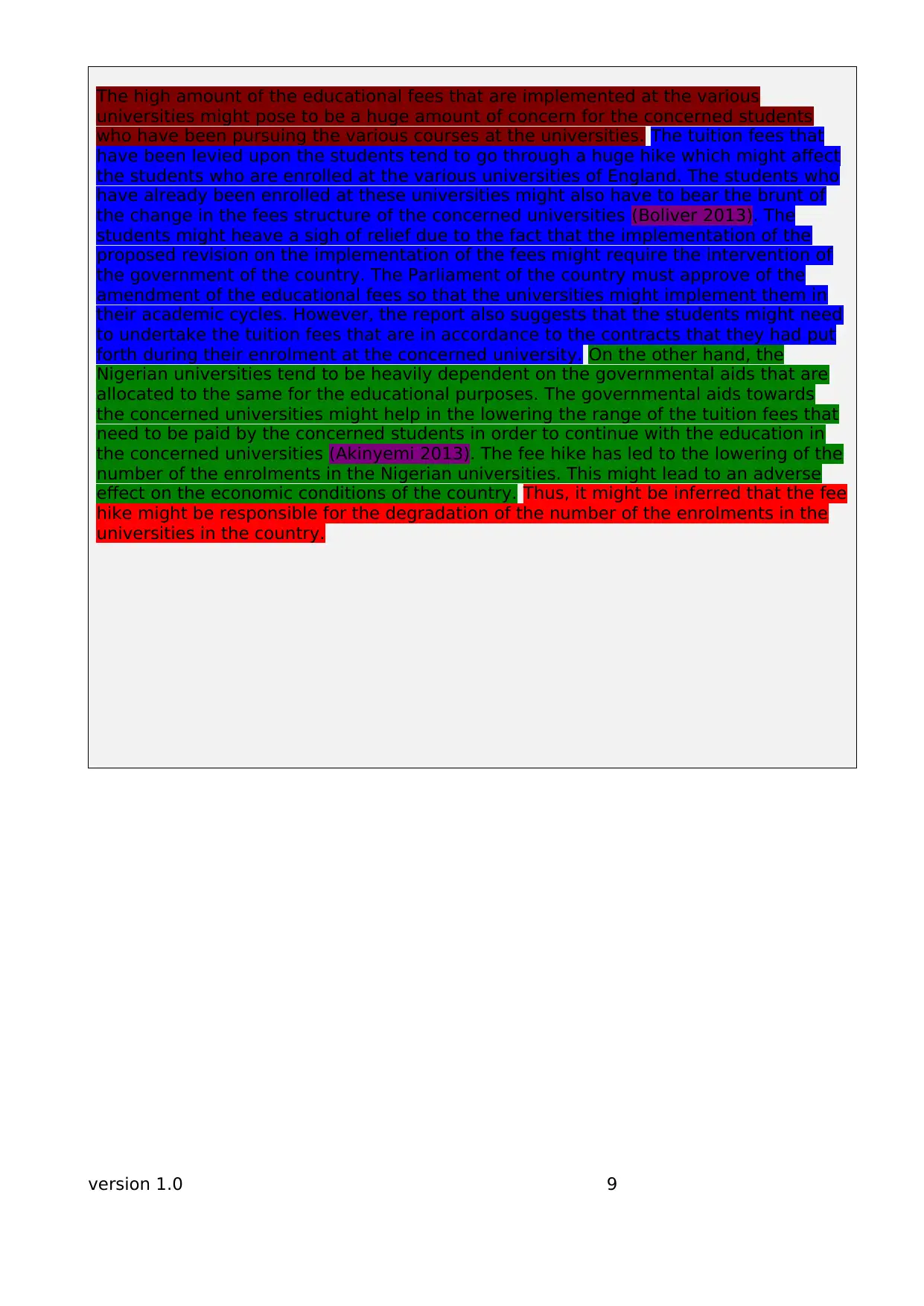
The high amount of the educational fees that are implemented at the various
universities might pose to be a huge amount of concern for the concerned students
who have been pursuing the various courses at the universities. The tuition fees that
have been levied upon the students tend to go through a huge hike which might affect
the students who are enrolled at the various universities of England. The students who
have already been enrolled at these universities might also have to bear the brunt of
the change in the fees structure of the concerned universities (Boliver 2013). The
students might heave a sigh of relief due to the fact that the implementation of the
proposed revision on the implementation of the fees might require the intervention of
the government of the country. The Parliament of the country must approve of the
amendment of the educational fees so that the universities might implement them in
their academic cycles. However, the report also suggests that the students might need
to undertake the tuition fees that are in accordance to the contracts that they had put
forth during their enrolment at the concerned university. On the other hand, the
Nigerian universities tend to be heavily dependent on the governmental aids that are
allocated to the same for the educational purposes. The governmental aids towards
the concerned universities might help in the lowering the range of the tuition fees that
need to be paid by the concerned students in order to continue with the education in
the concerned universities (Akinyemi 2013). The fee hike has led to the lowering of the
number of the enrolments in the Nigerian universities. This might lead to an adverse
effect on the economic conditions of the country. Thus, it might be inferred that the fee
hike might be responsible for the degradation of the number of the enrolments in the
universities in the country.
version 1.0 9
universities might pose to be a huge amount of concern for the concerned students
who have been pursuing the various courses at the universities. The tuition fees that
have been levied upon the students tend to go through a huge hike which might affect
the students who are enrolled at the various universities of England. The students who
have already been enrolled at these universities might also have to bear the brunt of
the change in the fees structure of the concerned universities (Boliver 2013). The
students might heave a sigh of relief due to the fact that the implementation of the
proposed revision on the implementation of the fees might require the intervention of
the government of the country. The Parliament of the country must approve of the
amendment of the educational fees so that the universities might implement them in
their academic cycles. However, the report also suggests that the students might need
to undertake the tuition fees that are in accordance to the contracts that they had put
forth during their enrolment at the concerned university. On the other hand, the
Nigerian universities tend to be heavily dependent on the governmental aids that are
allocated to the same for the educational purposes. The governmental aids towards
the concerned universities might help in the lowering the range of the tuition fees that
need to be paid by the concerned students in order to continue with the education in
the concerned universities (Akinyemi 2013). The fee hike has led to the lowering of the
number of the enrolments in the Nigerian universities. This might lead to an adverse
effect on the economic conditions of the country. Thus, it might be inferred that the fee
hike might be responsible for the degradation of the number of the enrolments in the
universities in the country.
version 1.0 9
⊘ This is a preview!⊘
Do you want full access?
Subscribe today to unlock all pages.

Trusted by 1+ million students worldwide
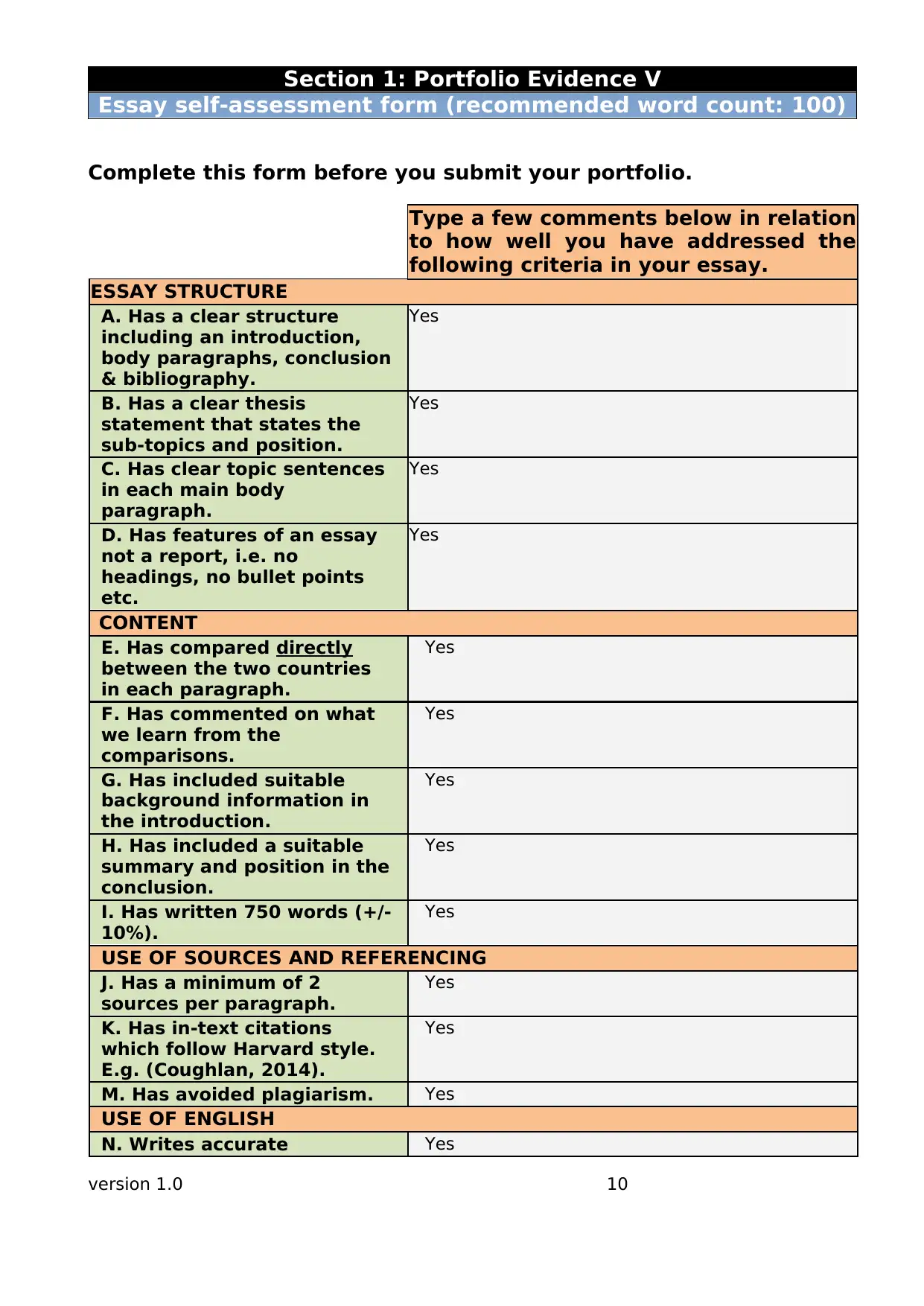
Section 1: Portfolio Evidence V
Essay self-assessment form (recommended word count: 100)
Complete this form before you submit your portfolio.
Type a few comments below in relation
to how well you have addressed the
following criteria in your essay.
ESSAY STRUCTURE
A. Has a clear structure
including an introduction,
body paragraphs, conclusion
& bibliography.
Yes
B. Has a clear thesis
statement that states the
sub-topics and position.
Yes
C. Has clear topic sentences
in each main body
paragraph.
Yes
D. Has features of an essay
not a report, i.e. no
headings, no bullet points
etc.
Yes
CONTENT
E. Has compared directly
between the two countries
in each paragraph.
Yes
F. Has commented on what
we learn from the
comparisons.
Yes
G. Has included suitable
background information in
the introduction.
Yes
H. Has included a suitable
summary and position in the
conclusion.
Yes
I. Has written 750 words (+/-
10%).
Yes
USE OF SOURCES AND REFERENCING
J. Has a minimum of 2
sources per paragraph.
Yes
K. Has in-text citations
which follow Harvard style.
E.g. (Coughlan, 2014).
Yes
M. Has avoided plagiarism. Yes
USE OF ENGLISH
N. Writes accurate Yes
version 1.0 10
Essay self-assessment form (recommended word count: 100)
Complete this form before you submit your portfolio.
Type a few comments below in relation
to how well you have addressed the
following criteria in your essay.
ESSAY STRUCTURE
A. Has a clear structure
including an introduction,
body paragraphs, conclusion
& bibliography.
Yes
B. Has a clear thesis
statement that states the
sub-topics and position.
Yes
C. Has clear topic sentences
in each main body
paragraph.
Yes
D. Has features of an essay
not a report, i.e. no
headings, no bullet points
etc.
Yes
CONTENT
E. Has compared directly
between the two countries
in each paragraph.
Yes
F. Has commented on what
we learn from the
comparisons.
Yes
G. Has included suitable
background information in
the introduction.
Yes
H. Has included a suitable
summary and position in the
conclusion.
Yes
I. Has written 750 words (+/-
10%).
Yes
USE OF SOURCES AND REFERENCING
J. Has a minimum of 2
sources per paragraph.
Yes
K. Has in-text citations
which follow Harvard style.
E.g. (Coughlan, 2014).
Yes
M. Has avoided plagiarism. Yes
USE OF ENGLISH
N. Writes accurate Yes
version 1.0 10
Paraphrase This Document
Need a fresh take? Get an instant paraphrase of this document with our AI Paraphraser
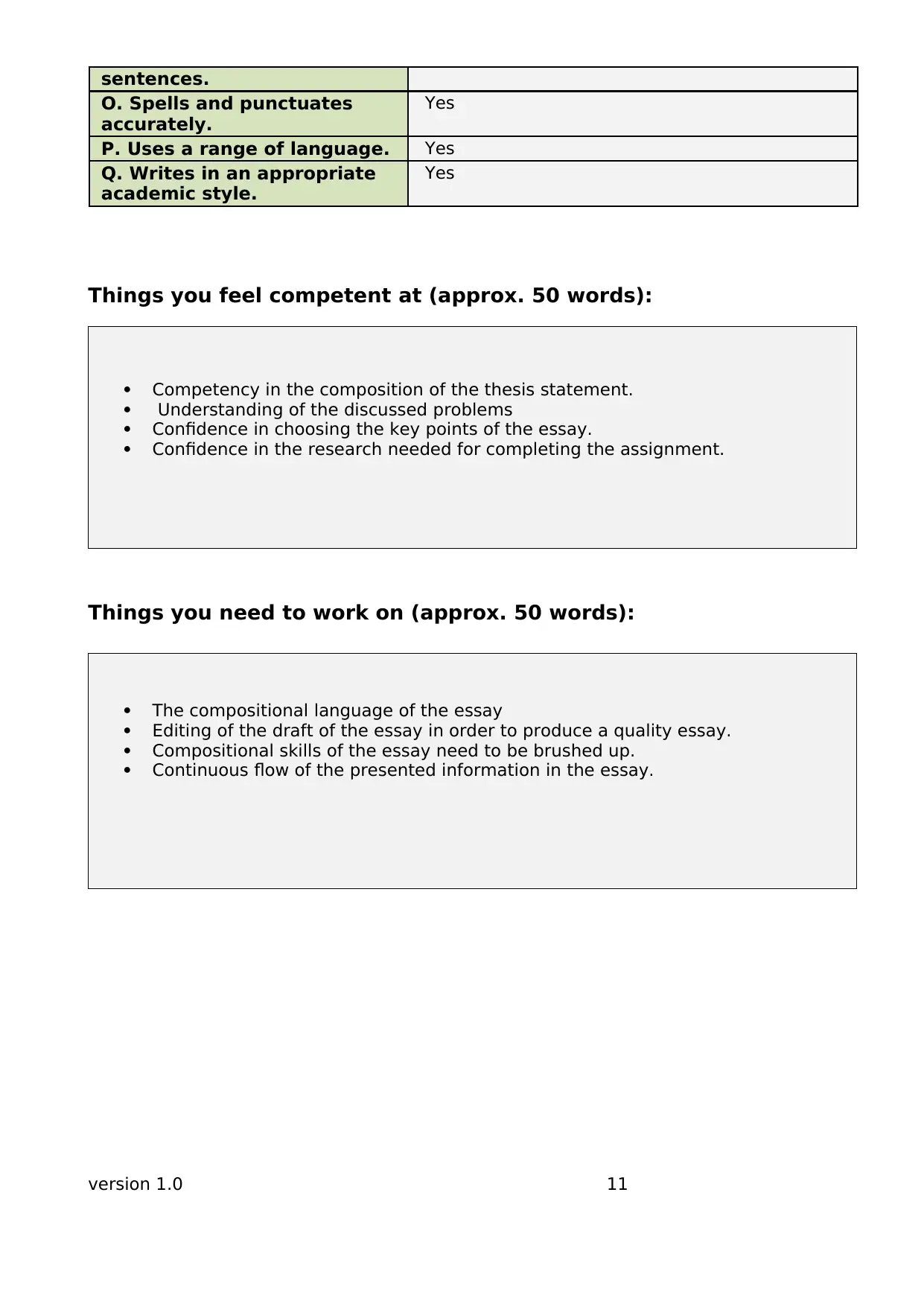
sentences.
O. Spells and punctuates
accurately.
Yes
P. Uses a range of language. Yes
Q. Writes in an appropriate
academic style.
Yes
Things you feel competent at (approx. 50 words):
Competency in the composition of the thesis statement.
Understanding of the discussed problems
Confidence in choosing the key points of the essay.
Confidence in the research needed for completing the assignment.
Things you need to work on (approx. 50 words):
The compositional language of the essay
Editing of the draft of the essay in order to produce a quality essay.
Compositional skills of the essay need to be brushed up.
Continuous flow of the presented information in the essay.
version 1.0 11
O. Spells and punctuates
accurately.
Yes
P. Uses a range of language. Yes
Q. Writes in an appropriate
academic style.
Yes
Things you feel competent at (approx. 50 words):
Competency in the composition of the thesis statement.
Understanding of the discussed problems
Confidence in choosing the key points of the essay.
Confidence in the research needed for completing the assignment.
Things you need to work on (approx. 50 words):
The compositional language of the essay
Editing of the draft of the essay in order to produce a quality essay.
Compositional skills of the essay need to be brushed up.
Continuous flow of the presented information in the essay.
version 1.0 11
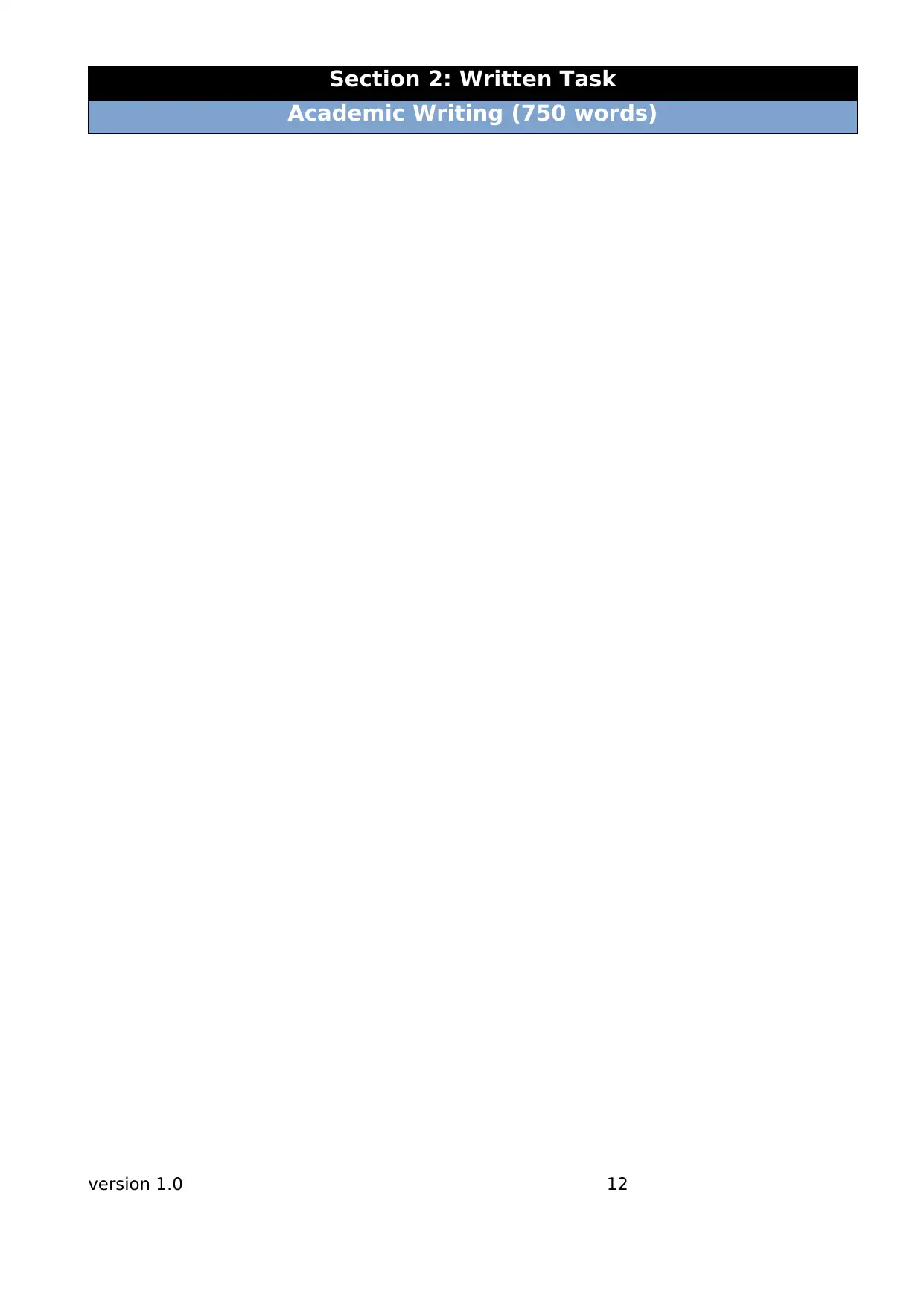
Section 2: Written Task
Academic Writing (750 words)
version 1.0 12
Academic Writing (750 words)
version 1.0 12
⊘ This is a preview!⊘
Do you want full access?
Subscribe today to unlock all pages.

Trusted by 1+ million students worldwide
1 out of 14
Related Documents
Your All-in-One AI-Powered Toolkit for Academic Success.
+13062052269
info@desklib.com
Available 24*7 on WhatsApp / Email
![[object Object]](/_next/static/media/star-bottom.7253800d.svg)
Unlock your academic potential
Copyright © 2020–2025 A2Z Services. All Rights Reserved. Developed and managed by ZUCOL.





